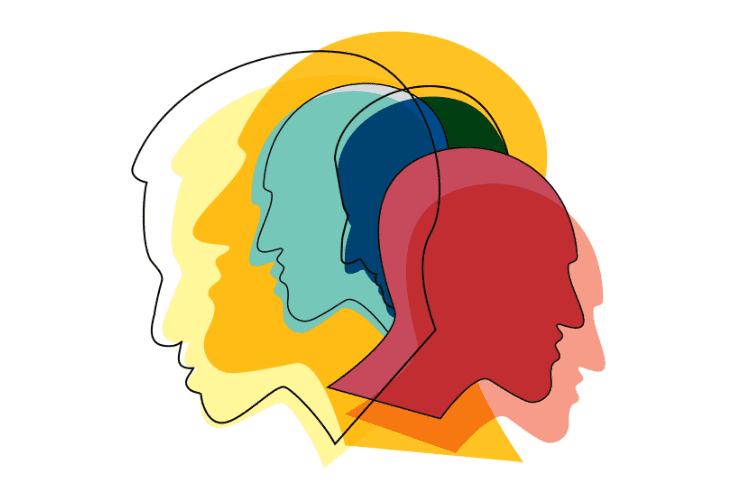April 14, 2021
By Jason Jepson

Back in the Army, when I was in the depths of undiagnosed schizophrenia, I wrote long letters asking my friends and family if they could see and feel what I was experiencing while stationed in the Mojave Desert. I thought if I could persuade them to stare at a TV or computer screen, and fixate on it, then they would be able to hear my voice, and I could hear their voices.
For example, I thought I could see my brother driving and showing up to work. In the letters I might ask him, “Could you feel my presence,” or “Do you remember seeing me?”
I also thought if people made eye contact with me, they could instantly mentally connect with me, and we could talk to each other without speaking. I could explain to them through our telepathy what was going on around me, and I thought it was possible for them to hear the same voices I was hearing inside my head. And not only did I think they were hearing the voices in my head, but I also believed it was negatively affecting them.
For example, I thought that one of my friends started sobbing when she was driving home because all the voices overwhelmed her. I did my best to tell her it was going to be okay. Another time, I told my aunt that she could block out the voices if she concentrated on her work or exercised.
The voices in my head are often family, friends or people I see around me. Since my delusions are based on real people, and feel real, I struggled for a long time to accept that they were delusions, which only worsened their power over me.
I still see visions in my head of people I know even though I am now in recovery. I might be listening to some music, and I see my dad working at his desk, tapping his foot. Sometimes when I’m cooking, in my mind, an old man appears who is trying to make me undercook the chicken, so I would get e-coli or some other illness.
I also have recurring delusions that revolve around an ex-girlfriend who I have not seen in more than 20 years. I think that either she or some of her friends are creating problems for me. When I can’t find something, my head immediately goes to blaming them for breaking into my apartment and stealing something as insignificant as a cover that goes over my disposable razor. It takes me a minute to think, why on earth would someone want to steal that?
Another delusion I have is thinking that my ex-girlfriend can influence my thinking, and is stealing my thoughts, or she makes me forget what I’m thinking. I have even thought my ex-girlfriend and her friends were trying to communicate with me through vanity license plates. Then I ask myself, why would anybody want to go to the DMV to communicate with an ex-boyfriend? Is that really worth a trip to the DMV?
One of the ways I’ve learned to cope with delusions is through ignoring and blocking them out. Otherwise, the thoughts can make me angry and paranoid. I try not to give these delusions power over my thoughts, but it’s a constant challenge.
Schizophrenia can be an annoying little fly, darting in and out, around my head, annoying me, even though I am trying to ignore it. Most of the time I know the delusion is not really happening, but the thoughts are still there, and they can seem very real to me.
My goal is not to give validity to my delusions, but to think through them in a logical manner. Sometimes I have to call my parents to discuss a delusion. They have learned to help me by asking questions about the evidence around me as to whether a delusion is true.
There have been times when the delusions became too much for me to handle, so I discuss them with my doctor, and he will adjust my medication accordingly. I am glad I can be honest with both my parents and my doctor. Delusions can be frightening, but talking about them with my support team can take away their power over me.
Jason Jepson lives in Richmond, VA, where he is Chair of the Veterans Council at the McGuire Veterans Hospital. Jason began his mental health advocacy with NAMI and has since gone on to volunteer with the Share Network, an arm of Janssen Pharmaceuticals. His story of recovery has been published in numerous online and print publications such as Yahoo News, The Mighty, Psych Central and OC87 Recovery Diaries. Jason's true love is writing. He has written two books, “When We Were Young,” a fictionalized memoir of his late teens, and a book of poetry called “Misfires of a Lyrical Mind.” Jason is proudest, however, of his first-person accounts that are published several times a year in Schizophrenia Bulletin, an academic journal published by Oxford Press. He is honored to be part of Students With Psychosis, and he is happy to share his life experiences in hopes of helping others.
We’re always accepting submissions to the NAMI Blog! We feature the latest research, stories of recovery, ways to end stigma and strategies for living well with mental illness. Most importantly: We feature your voices.
LEARN MORENAMI HelpLine is available M-F, 10 a.m. – 10 p.m. ET. Call 800-950-6264,
text “NAMI” to 62640, or email. In a crisis, call or text 988 (24/7).